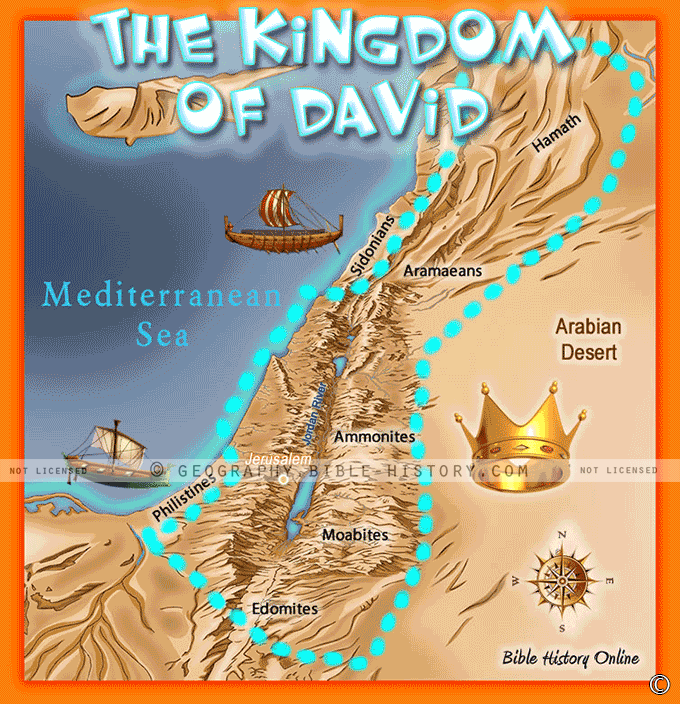
The Kingdom of David, often referred to as the United Kingdom of Israel, represents a pivotal period in the biblical narrative, a time of faith, leadership, and destiny. Founded by King Saul and solidified under the iconic King David, this kingdom symbolizes the covenant between the Israelites and their God, Yahweh, and marks the establishment of a dynasty that would leave an enduring mark on world history.
Rise to Power
The journey of the Kingdom of David began with the anointing of the young David as the future king by the prophet Samuel. His humble origins as a shepherd belied the strength of character and faith that would guide him through trials and triumphs. After David's victory over Goliath, his reputation as a leader and warrior grew.
Jerusalem: The Eternal City
One of David's most notable achievements was the capture of Jerusalem, which he transformed into the capital of his kingdom. This city, now known as the City of David, holds deep religious significance for Judaism, Christianity, and Islam. The city's capture marked the uniting of the northern and southern tribes, a critical step toward the formation of a united Israel.
The Ark of the Covenant
David's reign was marked by his desire to bring the Ark of the Covenant, a symbol of God's presence, to Jerusalem. This act demonstrated his commitment to centering the kingdom around their faith in Yahweh.
The Davidic Covenant
Perhaps the most profound aspect of David's legacy is the Davidic Covenant, a divine promise that his descendants would rule over an eternal kingdom. This covenant, rooted in the belief of a future Messiah, has profound implications in both biblical and theological contexts.
Legacy and Influence
The Kingdom of David's legacy extends far beyond its historical period. It is a foundational element in the biblical narrative, setting the stage for the rise and fall of Israel and Judah, the construction of Solomon's Temple, and the prophetic messages of hope for a future king in the line of David—the Messiah.
The Kingdom of David serves as a symbol of faith, leadership, and divine destiny. It embodies the belief in a God who chooses leaders from humble origins, the power of unity, and the enduring promise of an eternal kingdom. As we explore this ancient kingdom, we encounter a narrative that has shaped religious beliefs, cultural heritage, and the profound hope for a future king who will fulfill the Davidic Covenant.
Blank Topo Map of The World
Abraham’s Journey
The Captivity of Judah (586-516 B.C.)
The Fall of Judah 586 B.C.
The Northern Kingdom of Israel
The Southern Kingdom of Judah
The Divided Kingdom
The Fertile Crescent
Ur of the Chaldees
Shechem in Old Testament Times
Prophets, Kings, and Nations
Jesus Last Passover
New Testament Israel
New Testament Places
Old Testament Israel
Provinces of the Roman Empire
Israel during David’s Kingdom
David’s Kingdom
Cities of the New Testament 4
Cities of the New Testament 3
Cities of the New Testament 2
Mediterranean Sea
Cities of the New Testament
First Century Jerusalem
Empire of David and Solomon
David’s Kingdom
Israel Under Rehoboam
Ophir and Tarshish
The Period of the Kings
Ramoth Gilead
Samaria
Solomon’s Temple
Zarephath and MT Carmel
Jabesh Gilead and Tribes
Judah in the Time of David
Kingdom of Saul
Kirjath Jearim
Michmash
Mount Gilboa in the Time of David
Nob Davids Flight
Shiloh
Israel and Judah
Assyrian Empire Under Esarhaddon
Assyrian Empire Under Sennacherib
Captivity of 10 Tribes
Events in 2 Kings
The Khabur River
Israel and Syria
Captives From Judah
Kingdom of Jeroboam
Mesha’s Kingdom
Pharaoh Necho Battles King Josiah at Megiddo
Babylonian, Mede and Persian Empires
Samaria and Nearby Territories
Syria at its Height
Hebron
Mahanaim
1949 Map of Israel With Boundaries
First & Second Journeys of Paul
Journeys of the Apostles
Paul’s Third Missionary Journey
Saul’s Journey to Damascus and Arabia
Paul’s Final Visits
Paul’s 1st Missionary Journey
Paul’s 2nd Missionary Journey
Paul’s 3rd Missionary Journey
Paul’s Voyage to Rome
Phillip Journeys to Samaria and Gaza
Judah at the Time of Amos
Empire of Alexander the Great
Israel Under the Maccabees
Galilee During Maccabees
Idumea Intertestamental Period
Kingdom of the Ptolemies
Kingdom of the Seleucids
Ptolemaic Egypt Seleucid Asia
The Roman World
Kingdom of Ptolemies and Seleucids
The World During the 6TH Century BC
Mount Horeb
The Red Sea
The Exodus
Ezra’s Journey to Restore Jerusalem
Israel and Judah During Hosea’s Time
The Ancient World
Canaan During the Time of Abraham
The City of Shechem
Supposed Location of the Garden of Eden
The Land of Israel in Genesis
The Jordan River
The Kingdom of Nimrod
Mount Ararat and Mesopotamia
The Descendants
Sodom and Gomorrah
The Kingdom of Egypt
The Hamites
The Kingdom of the Hittites
Ur of the Chaldees
Judah at the Time of Haggai
Jesus Passes Through Samaria
